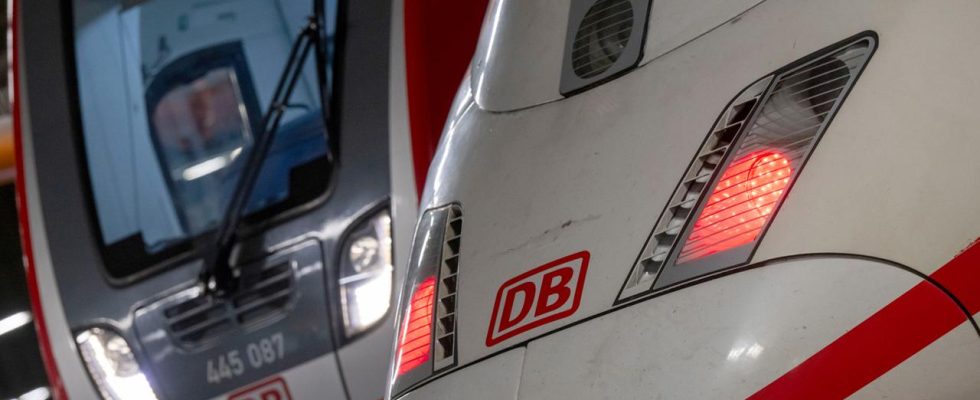After 120 hours, the GDL strike on rail passenger transport is over. Some connections are likely to be canceled on Monday. The signs between the collective bargaining parties are now pointing to understanding instead of escalation.
The GDL train drivers’ union has prematurely ended its multi-day strike on Deutsche Bahn passenger transport. A DB spokesman announced this early on Monday morning.
From the start of operations, the railway wants to use the normal timetable again. “However, there will still be isolated restrictions on long-distance transport services over the course of Monday,” it said. “There may also be regionally different restrictions in regional traffic during the course of Monday,” warned the company.
Freight traffic has been running since Sunday evening
Since the passenger transport strike began on Wednesday morning, the railway has been working with an emergency timetable. In long-distance transport, around 20 percent of the usual offering was on the move. With the emergency timetable, the railway also wanted to enable operations to start as smoothly as possible after the strike.
In freight transport, the strike ended on Sunday evening. According to its own information, the railway has been working through the traffic jam since 6 p.m. “Experience shows that it takes several days until freight traffic is back in regular operation,” said a DB spokesman. In freight transport, trains are usually not canceled due to a strike; instead, a long traffic jam occurs.
Duty of peace until March 3rd
The strike was actually supposed to last until Monday evening at 6 p.m. in both passenger and freight traffic. However, on Saturday night, the railway and the GDL agreed on an early end and new negotiations from February 5th. These should be held behind closed doors.
Both sides stated that the goal was to reach a collective bargaining agreement at the beginning of March. A peace obligation applies up to and including March 3rd – so strikes are currently not an issue.
As things currently stand, strikes at the railways will not be an issue in the next five weeks. The street carnival from February 8th to 13th also falls during this time, when the trains are usually very full, especially in the Rhineland.
Federal Transport Minister Volker Wissing welcomed the return to the negotiating table. “I call on both collective bargaining parties to approach the talks with the necessary seriousness and to work responsibly on a solution,” said the FDP politician. “The strikes of the last few days have been an enormous burden for rail passengers and our companies.”
Negotiations in a “constructive atmosphere”
On Saturday morning it became known that both sides were in talks again. It was said that all topics were discussed in a “constructive atmosphere” and formed into a roadmap for further negotiations. “In the event that one of the two sides reports the need, two moderators will be called in immediately to provide support,” the railway said.
The payment of a 1,500 euro inflation compensation bonus in March has already been firmly agreed. This payment is tax and duty free for the employees.
The issue of working hours, which is particularly important for the GDL, is also on the agenda for the upcoming negotiations. It was said that the railway is already talking about “models for reducing working hours” for shift workers.
The railway has also agreed to talk about a fixed fee increase. Until now, the federally owned company had always spoken out in favor of percentage increases. Fixed amounts generally help lower income groups in particular and are therefore often preferred by unions to negotiate.
Strike costs railways millions
The collective bargaining conflict between the railways and the GDL began at the beginning of November. The union entered the negotiations with the demand for three hours less weekly working time for shift workers with the same wages. She also wanted to achieve 555 euros more in wages for a twelve-month term of the collective agreement.
The current offer from Deutsche Bahn provides 4.8 percent more money for employees from August and a further 5 percent more from April 2025. According to this offer, from January 2026, train drivers and train attendants can then decide between a further pay increase of 2.7 percent or one hour less work per week.
The current strike is the fourth strike since the collective bargaining dispute began. Like the three previous GDL industrial disputes, it caused thousands of train cancellations. According to the company, each day of the strike cost the railway 25 million euros. The costs for the GDL cannot be precisely quantified. According to Weselsky, the union pays the strikers 10 euros in strike pay per hour and a maximum of 100 euros per shift.
There is a threat of a strike in public transport
After the warning strike at the railways ends, there is a risk of work stoppages on buses and trains in large parts of Germany. The ver.di union wants to provide information in the afternoon about possible warning strikes in local public transport (ÖPNV) in several federal states.
For several days now, the union has been negotiating collective agreements in local public transport in all states except Bavaria. In some countries it is about higher wages, in other places the so-called collective agreements, i.e. the working conditions, are being renegotiated. According to the union, the collective bargaining round will affect more than 130 municipal companies and around 90,000 employees in the cities and districts.

